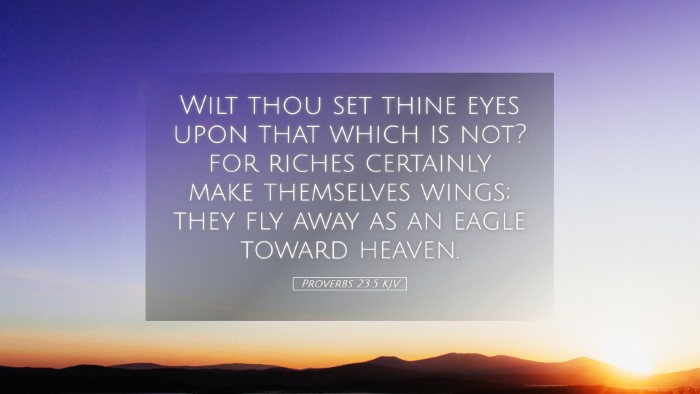Commentary on Proverbs 23:5
Verse (Proverbs 23:5, KJV): "Wilt thou set thine eyes upon that which is not? For riches certainly make themselves wings; they fly away as an eagle toward heaven."
Introduction
Proverbs 23:5 encapsulates profound truths about the nature of wealth and its fleeting nature. This verse issues a caution against the allure of riches, reminding believers that material possessions can be temporary and deceptive. Through the insights gleaned from notable public domain commentaries, we will explore the theological, practical, and moral dimensions of this verse.
Contextual Overview
Proverbs 23 is part of a larger discourse attributed to Solomon, offering wisdom on various aspects of life, including wealth, consumption, and association. Many of these proverbs address the pursuit of material gain and its implications for one's spiritual and social life.
Analysis of Key Phrases
“Wilt thou set thine eyes upon that which is not?”
This rhetorical question serves as a warning. The phrase implies an act of contemplation or desire for something that is ultimately illusory. Matthew Henry emphasizes that the pursuit of material wealth often leads to spiritual blindness, urging the faithful not to covet what will not satisfy.
“Riches certainly make themselves wings”
The imagery of riches taking flight is powerful; it captures the transient nature of wealth. Albert Barnes suggests that this metaphor illustrates how quickly fortunes can change, cautioning about the dangers of over-reliance on material possessions. Riches can vanish as swiftly as they are gathered, highlighting their impermanence and unreliability.
“They fly away as an eagle toward heaven”
This simile reinforces the idea of sudden loss and the inability to recapture what has been lost. Adam Clarke notes that the comparison to an eagle emphasizes the swiftness of its flight, suggesting that wealth can escape one's grasp without warning. Those who trust in material wealth may find themselves bereft when it departs, underscoring the futility of such trust.
Theological Implications
At its core, Proverbs 23:5 challenges believers to reassess their priorities. The inclination to place hope in riches can draw one away from reliance on God. Trust in God versus Trust in Wealth becomes a key theme. Matthew Henry posits that ultimate security lies not in material abundance but in a deep relationship with the Creator.
Moral Lessons
- Beware of Materialism: The desire for wealth can lead to ethical compromises and a neglect of spiritual responsibilities.
- Focus on Eternal Value: Believers are called to invest in things of eternal significance rather than fleeting riches.
- Contentment: Learning to be content in all circumstances provides a safeguard against the allure of wealth.
Application for Today's Believers
In a culture that often equates success with fortune, Proverbs 23:5 serves as a counter-narrative. Pastors and leaders are urged to teach congregants about the importance of prioritizing spiritual wealth over material gain. Albert Barnes advocates for a balanced view of riches: while they are not inherently evil, they must not be the foundation of one’s life. Instead, a proper perspective on wealth recognizes it as a tool for God’s glory.
Conclusion
Proverbs 23:5 remains a relevant warning against the temptation of wealth and materialism. Through careful contemplation of its meaning and the insight from historic commentaries, believers can better understand the transient nature of riches and the call to focus on what truly lasts. As followers of Christ, the assurance of His provision offers a far greater comfort than any earthly treasure could provide.


